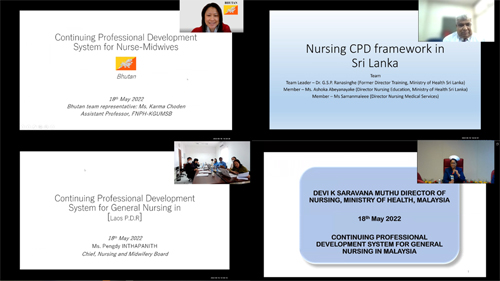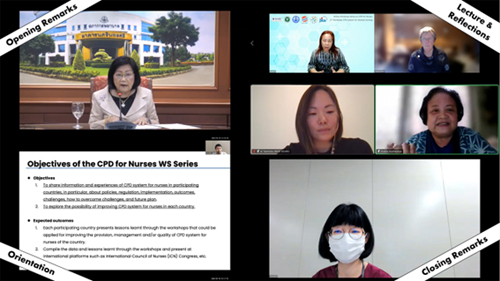- Home
- Technical Cooperation Projects
- Index of Countries
- Asia
- Thailand
- The Partnership Project for Global Health and Universal Health Coverage Phase 2
- Project News
- The 2nd Workshop of Online Workshop Series on Continuing Professional Development for Nurses: CPD System for General Nursing
Project News
2022-05-18
The 2nd Workshop of Online Workshop Series on Continuing Professional Development for Nurses: CPD System for General Nursing
The 2nd Workshop of Online Workshop Series on Continuing Professional Development (CPD) for Nurses was held on 18th May 2022. Around 60 participants and 40 observers from 14 countries joined. The topic of the 2nd workshop was "CPD System for General Nursing." In this workshop, we defined "CPD for general nursing" as the common CPD activities/ programs that can be applied to all nurses regardless of their specialities or working fields.
The workshop began with the opening remarks from Assoc. Prof. Dr. Suchittra, President of the Thailand Nursing and Midwifery Council (TNMC), welcoming all and stating the importance of strengthening CPD system of nurses in achieving the Universal Health Coverage (UHC).
A guest speaker, Dr. Christine Duffield, President of Australian College of Nursing (ACN) gave a lecture on the general concept, theory, and the world's situation on CPD for general nursing. She shared many important points including the basic principles of CPD, developing CPD for regulation, components of contemporary CPD, CPD for nurses in Australia, considerations when mandating CPD, etc. In her summary, she mentioned that the evidence is not conclusive as to whether CPD enhances practice, but at the same time, there is nothing to suggest that you would not do it.
Then, we moved on to the country presentations. Speakers from Bhutan, Lao PDR, Malaysia and Sri Lanka shared the situation and plan of CPD system for general nursing.
Bhutan formulated guideline and framework of CPD in recent years. Although the system is still new, it is well structured. The requirements of CPD varies by the nurses' involvement in clinical practice or teaching.
Lao PDR is thoroughly developing its CPD system based on Benner's nursing theory "From Novice to Expert." They have a plan to include a wide range of topics in the CPD programs including basic components of nursing and global and local health issues.
CPD system in Malaysia commenced from 2008. They have CPD system which is well organized to link with the re-licensure and thus make CPD mandatory for all nurses.
Sri Lanka is also strengthening its CPD system. They are planning to establish CPD-point system and to keep records in database.
All speakers were requested to include the changes in CPD system for general nursing caused by the COVID-19 pandemic. Those changes in the four countries were similar; they included topics related to COVID-19 such as infection control and critical care, and they also had to reduce or limit the CPD programs during the pandemic.
Reflections were shared from two experts. Ms. Ai Tanimizu (WHO SEARO) mentioned the needs of assessment and evaluation on impacts and cost effectiveness of CPD. She introduced the competency assessment tool for nursing educators which is being developed by WHO SEARO. Dr. Prakin Suchaxaya (TNMC) emphasized the need of having CPD committee at national level and at institutional level, i.e., at each work place. She explained that the management of CPD for nurses such as deciding the topics and contents of CPD should be considered at both levels as well as at the level of individual nurses.
The 2nd CPD workshop ended with closing remarks from Ms. Tomomi Gotou, Director of Office of Nursing Service, Nursing Division, Health Policy Bureau, Ministry of Health, Labour and Welfare, Japan, thanking all for joining and wishing the continuation of the workshop series to contribute to the establishment and improvement of CPD systems in our regions and beyond.
From the country presentations and the responses to the pre-workshop questionnaire, we found that many of the participating countries set topics such as patient safety, infection control, nursing ethics, nursing research, information technology in hospital, etc., to be included in the CPD programs / activities for general nursing. You may think that these are things that they have learnt at nursing school or college, "why do they have to learn as CPD again?" As Dr. Prakin mentioned in her reflection, the reason is because these are the key concepts and important procedures which assure the safety and the quality of service for the people or patients. Nurses are expected to have updated skills and knowledge of these issues.
Many important issues were raised in the 2nd workshop. We hope to go deeper into those issues in the next workshop.
This workshop was hosted by:
- Asia Pacific Action Alliance on Human Resources for Health (AAAH),
- Japan International Cooperation Agency (JICA),
- Ministry of Public Health, Thailand,
- National Health Security Office (NHSO), Thailand,
- Thailand Nursing and Midwifery Council (TNMC), and
- GLO+UHC Phase 2


- About JICA
- News & Features
- Countries & Regions
- Our Work
- Thematic Issues
- Types of Assistance
- Partnerships with Other Development Partners
- Climate Change / Environmental and Social Considerations
- Evaluations
- Compliance and Anti-corruption
- Science and Technology Cooperation on Global Issues
- Research
- JICA Development Studies Program / JICA Chair
- Support for the Acceptance of Foreign HRs / Multicultural and Inclusive Community
- Publications
- Investor Relations
